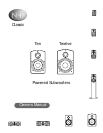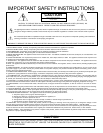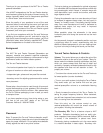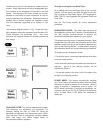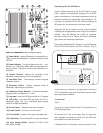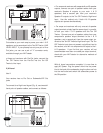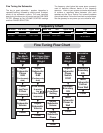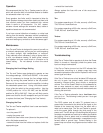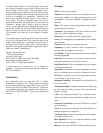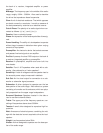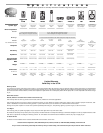The key to placing your subwoofer for optimal enjoyment
is to remember that low frequencies produce sounds with
long wavelengths, which interact in complex ways with
room boundaries, such a walls and corners, and other
large objects as well.
Placing the subwoofer near to a room boundary will tend
to increase its apparent bass output, but may result in
"boomy" or "muddy" sound. Conversely, placing it farther
away from room boundaries will tend to decrease its
apparent bass output, but may result in improved
articulation and clarity.
When possible, place the subwoofer in the same
horizontal plane and along the same wall as the main
speakers.
And since small changes in subwoofer position can have
a significant effect on sound, experimenting with the
effects of different placements in your own listening/view-
ing room is the key to finding the sound you like best.
Ten and Twelve Features & Controls
Volume: This control allows you to adjust the gain of the
Subwoofer relative to the rest of your system. Many lis-
teners make the mistake of setting subwoofers too loud,
which can cause excess bloat and loss of detail and
musicality. A properly calibrated subwoofer blends in with
the speakers and does not call attention to itself. To
properly set volume:
• Turn down the volume control on the Ten and Twelve to
its lowest position (counter-clockwise).
• Turn on your audio system, including the Ten orTwelve.
Play some music you are familiar with and set your
receiver/preamplifier volume to a comfortable listening
level.
• Slowly increase the volume of the Ten or Twelve, lis-
tening for proper frequency balance. When balanced,
you will hear improved bass extension, but not be aware
that it is coming from the subwoofer.
From this point on, the volume control on your
receiver/preamplifier will control the overall volume of
your system, including the subwoofer.
The Boundary EQ: This is a feature unique to NHT
products. Reflective boundaries (such as walls) rein-
force a speaker’s bass output (3dB for two walls, 6dB for
a corner) if the subwoofer is placed near them.
Conversely, placing a subwoofer out in the room results
in a relative decrease in bass output. Boundary rein-
Thank you for your purchase of the NHT Ten or Twelve
powered subwoofer.
Like all NHT loudspeakers, the Ten and Twelve develop-
ment has been guided by the study of human hearing, it’s
design rigorously tested, and its components optimized
to deliver clean, clear musical sound.
Since the quality of your speakers is one of the most
important factors in maximizing the sound you'll get from
your music and home theater system, we're sure that
you'll find your purchase of the Ten and Twelve a good
investment, and invite your comments.
If you find your experience with the Ten and Twelve as
satisfying as we believe you will, and wish to enjoy its
high quality sound through your entire system, you'll find
information about other sonically matched NHT Classic
Series loudspeakers on the back of this manual.
Background
The NHT Ten and Twelve Powered Subwoofers are
compact, versatile and powerful amplified subwoofer
designed to provide low frequency reinforcement for high
performance audio and home theater systems.
The Ten and Twelve features:
• line-level and speaker-level inputs, for connection with
all types of receivers or other audio components
• independent gain, phase and low pass filter controls
• boundary control for adjusting system sound for various
room placement
Please take a few minutes to read through this owner's
manual before setting up your speakers; this information
will help you get the most out of them. Also, please keep
the Ten or Twelves packaging to use in case you move
or transport them.
If you have questions at any time during setup or use,
feel free to call your NHT dealer or our Toll-Free
Customer Hotline at 1-800-NHT-9993.
Placement
Note: To prevent the Ten and Twelve subwoofer amplifi-
er from overheating, always be sure to provide adequate
space for proper ventilation. Do not place the subwoofer
directly against the wall or any other surface.



